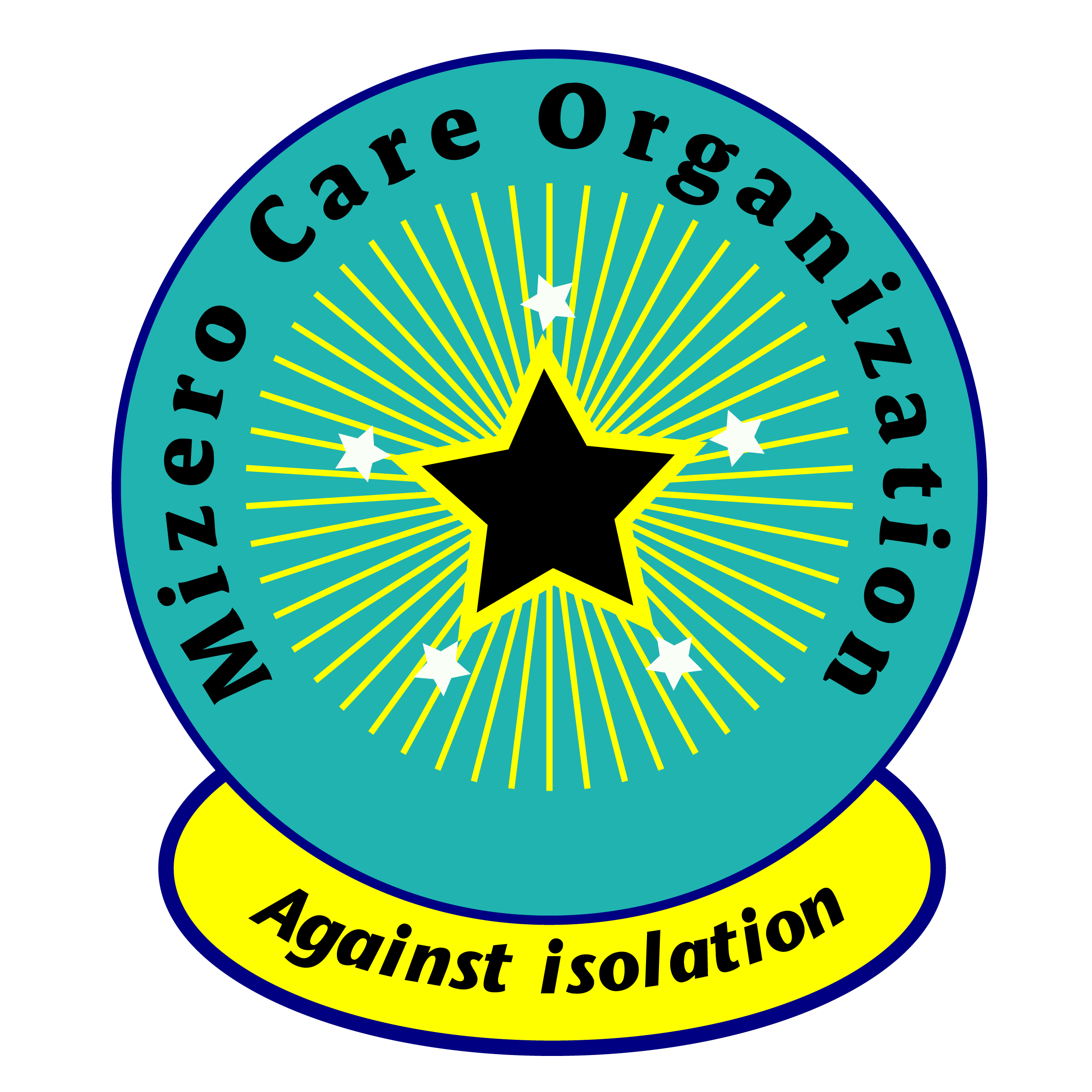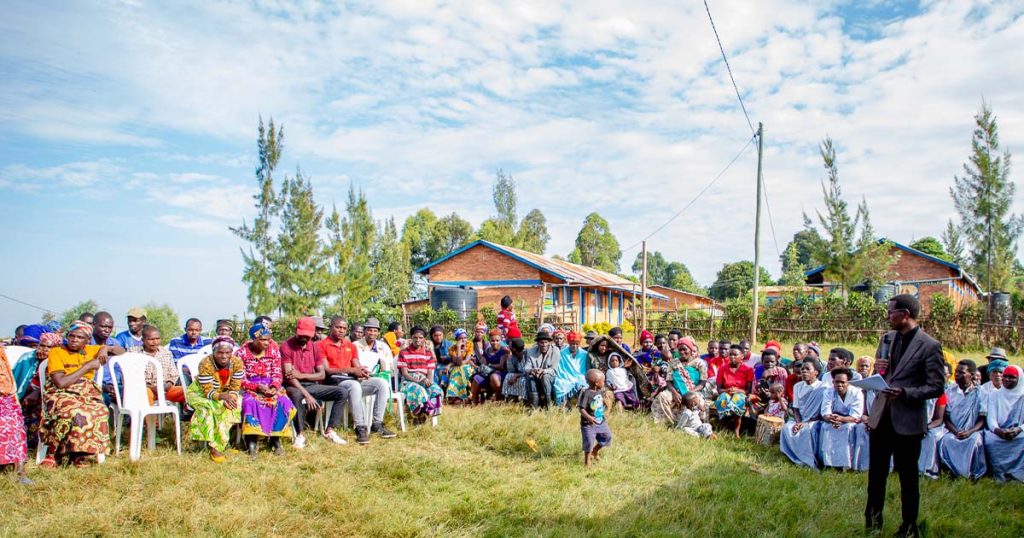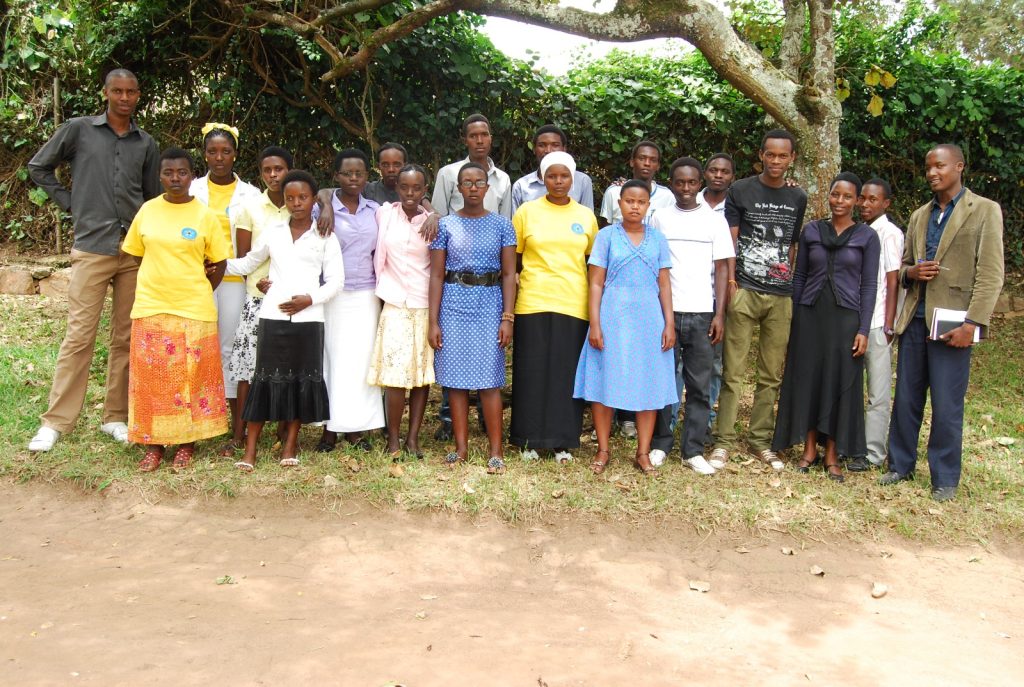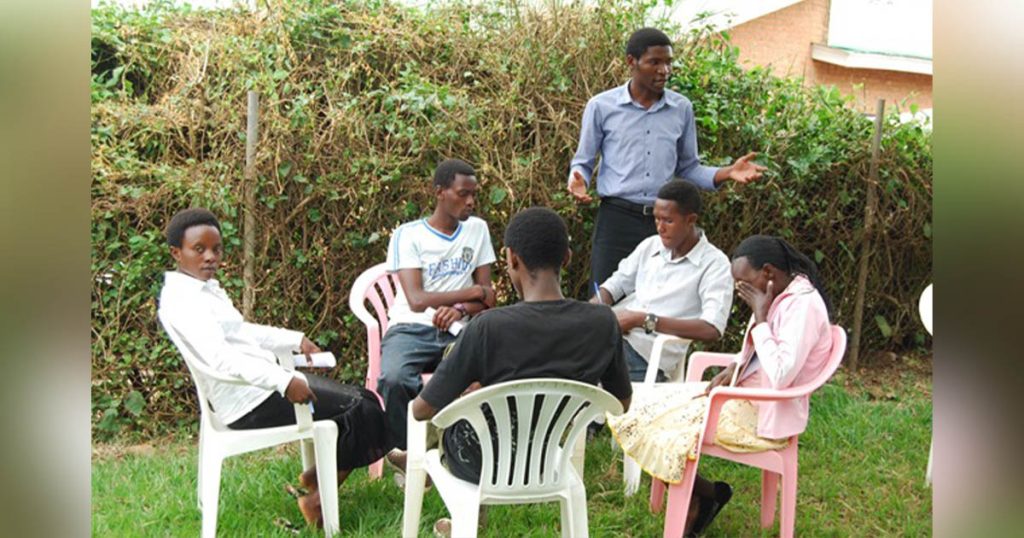On Friday, 3rd February 2023 in the Citizens’ Community Council held at the Gashirira garden, Ruvune sector in Gicumbi district attended by over five hundred (500) citizens from different levels, and leaders in charge of different responsibilities in the Gicumbi district, started a campaign on the care of mental health issues caused by the 1994 Genocide against the Tutsi organized by Mizero Care Organization (MoC) in collaboration with the Ministry of National Unity and Civic Education, Republic of Rwanda (MINUBUMWE), and the Gicumbi district.


The Executive Secretary of Ruvune sector welcomed guests from the district in an interesting greeting as ” Let’s be Wealthy”, Let’s be secure!”, presented leaders in their respective diversities; duties and responsibilities in the sector, including the Friends of Family (IZU), Youth leadership committees, and the President of IBUKA in the Ruvune sector.


Through the great dance performance of the Gashirira’s cell cultural group, a poem was presented by Mukeshimana entailing a background on how the 1994 Genocide against the Tutsi happened – an enemy separating siblings. She went further to thank the Rwanda Patriotic Army (RPA) that rescued Rwanda, stopped the 1994 Genocide against the Tutsi, and liberated the country. She reminded of the value those lost their lives during the 1994 Genocide against Tutsi have, effects of the 1994 Genocide against the Tutsi such as Trauma, but organizations like Mizero Care Organization (MoC) are coming as a solution to the victims of the 1994 Genocide against Tutsi, and closed by requesting all citizens to join hands in healing, and ensure the 1994 Genocide against the Tutsi won’t happen again.

Iréné Mizero, the Executive Director of Mizero Care Organization (MoC) was given a space to explain the planned activities in the Gicumbi district, where he explained that, they have attended the planned activity that was jointly organized in collaboration with the Ministry of National Unity and Civic Engagement, Republic of Rwanda (MINUBUMWE), and the Gicumbi district.
He deeply explained that a local non – government organization called “Mizero Care Organization (MoC) was established in 2013. The organization helps Youth mainly in healing and fighting against mental health issues resulting from the effects of the 1994 Genocide against the Tutsi and realizing sustainable development. Activities of this organization were recognized by Her Excellency Jeanette Kagame, the First Lady of the Republic of Rwanda awarded Mizero Care Organization (MoC) when she presented us a Celebrating Young Rwandans Achievers (CYRWA) award for transforming the lives of Youth and participate into societal development. The founder of the organization recently received another award from the Unity Club as Umurinzi w’Igihango “Rwanda Friendship pact award”.
Mizero Care Organization is one of the organizations that signed a memorandum of Understanding with Rwanda’s Ministry of National Unity , and Civic Engagement (MINUBUMWE) in collaboration with Gasabo, Kamonyi, and Gicumbi Districts to implement a project aimed at promoting social healing, social cohesion, and community resilience among Rwandans.
Using the measurements including the National Unity, and Reconciliation Commission (NURC) in the country (Rwanda Reconciliation Barometer 2020) which highlighted that the number of respondents who said they still haven’t healed yet, the number increased from 4.6% in 2015 to 26.7% in 2020. Other reports totaling to forty (40) compiled, including that from the Rwanda Biomedical Center (RBC) in 2018, shows that numbers of victims with mental health issues resulting from the effects of the 1994 Genocide against the Tutsi are high (RBC RMHC 2018), the report highlights that of 27.9% survivors of the 1994 Genocide against Tutsi, 35% have depression, 26% have panic disorder.
He presented a picture of mental health issues in general;
- The majority of Youth received MoC’s counseling services related to mental health issues, have challenges of finding a safe and trusted space where they can freely talk about their issues.
- People continue to gain an understanding that mental health issues have a connection with the 1994 Genocide against the Tutsi
- There are people who have mental health issues, but don’t know that they actually do.
- There are people who have mental health issues, acknowledge that they do, but don’t know ways through which they can be helped.
- There are people who have mental health issues, and acknowledge that they do have such issues, but can’t afford to go to health centers for help because mental health services are very expensive, usually these services stress normal people with no issues, imagine how one with mental health issue feels! Some people with mental health issues are vulnerable groups.
He emphasized that efforts were made by the Government of Rwanda especially through the Ministry of National Unity and Civic Engagement (MINUBUMWE) , and other partners. He highlighted that the journey is still in progress, and that mental health issues concern all both the young, and adults, parents should protect children,and children should protect elders, and give them a hand through this challenging journey.

He highlighted key activities planned;
- Activities related to healing ( individual and group therapy, the talk and heal program, toll free for online counseling 8050).
- Activities aimed at promoting the well being and social cohesion between citizens.
- Activities of self development.
The Executive Director of Mizero Care Organization delivered a message of hope when he said “Prevention against mental health issues is possible. Allowing to share the burden in your heart heals the heart, and increases resilience most especially when people pay attention and actively listen to you. That is a battle too, but , we will win it, if we work together”.

He closed his remarks by requesting all people in need to approach mental health care service where he again reminded of her Excellency the first lady of the Republic of Rwanda Jeanette Kagame’s message in a letter she addressed to Youth;
The way mental health illness is accomodated in the family doesn’t necessarily mean that there is no love, but it is the burden of lack of understanding, and failure to accept that we have an emergency because “a heroe suffers in pain!” And people decide a way that surrenders to this sickness, a decision that kills them more. But we all know that integrity can’t be held hostage forever.

The President of IBUKA, Gicumbi district, KAMIZIKUNZE Anastase, Appreciated that in 2019 on the 25th National Commemoration, it was highlighted that there were mental health issues, and thanked the government of RWANDA through MINUBUMWE that though those issues are still existing, we are now talking about them. In reality, you would find survivors expected to move on the same speed as others while they still have a heavy load to carry that can’t allow them to run on such a speed. He gave examples of those who studied Universities and failed to complete, others failed to do their jobs, and requested that these groups should be given a special focus. He requested those with mental health issues not to keep silent, instead talk to people they trust. He also promised collaboration that they are ready to join groups of Unity, and resilience because these are needed in the journey of healing.
The head of the department of mental health unit at Mizero Care Organization, Clinical Psychologist Sylvestre Twizerimana said that ” We came here to talk about the difficult problems caused by the effects of the 1994 Genocide against the Tutsi, the Genocide that broke the heart of Rwandans”.
He mentioned that mental health issues cause disability, that 20% of teenagers have mental health issues, suicide is the second cause of death in the world, in countries that experienced war and conflicts a fifth (1/5) of their population have mental health issues. Mental health patients are commonly known for facing stigma, and denial of the their rights. When the mental health patient experiences disturbances, it escalates trauma even more.
He also said that some of the causes of mental health issues include death, conflicts, normal sickness, and pandemics such as COVID-19. He advised them to approach health centers, hospitals, therapy sessions, treatment of hurtful thoughts, abnormal behaviors, mental sickness, and regain hope. He encouraged us to heal each other’s wounds through healthy conversations, comforting each other that “be strong, you are not alone”. He warned participants to say that ” …… is mad or insane”. He/she is not mad, He/She has a mental health issue. When these mental health issues are treated, there is hope that the heart finds solace, and regains hope, choosing this is doing good for yourself – it is a second chance of life.
The Vice Mayor, in charge of Economic Affairs, Mrs Parfaite Uwera after welcoming the guests who came in Gicumbi district, She said that “there is no one who can’t fail, we are human beings, having mental health issues is normal”. Here at Gashirira, we have started a campaign on mental health care, this is a good example of what is possible. She added. These Unity, and resilience groups must be ours, they must a bold foundation, empower us to make a step, eradicate poverty, and jointly achieve economic development.
I thank everyone who has given their time to be with us in the dark history we all share. I thank Psychologist Sylvestre who emphasized this a lot in his presentation – healing is possible to build the Rwanda we want. Those who have issues we know them, let me pin this even more; let’s neither be shy, nor allow stigma to hold us hostage, instead let us discuss the issues.
Before I close my remarks, I can’t close without reminding that we are approaching the 29th National Commemoration week, these partners have come as solutions to give us a hand, let this be our opportunity to heal, work together to achieve development, I request you to own this initiative Unity, and resilience as the main pillar. I officially open, and give a warm welcome to Mizero Care Organization, and promise that we commit to participate in all activities aimed at helping our citizens to heal from the effects caused by the 1994 Genocide against the Tutsi and achieve economic development.
The Vice Mayor took the opportunity to remind citizens to ensure hygiene is practiced from parents all the way to their children because hygiene has a source. She mobilized citizens to collaborate in the program called ” Citizen have me, I have you, we arrive together”. She also reminded citizens to participate in the health insurance, family planning, Ejo Heza long term saving scheme, fighting family conflicts, drugs abuse named as ” Dondubwonko”, which means when translated “Smash the Brain”, avoiding wasting harvest instead find other means to achieve economic prosperity. She also mentioned that illegal mining of Wolfram should be avoided to prevent accidents, and closed by requesting the collaboration of citizens to ensure that the security of Ruvune sector is achieved sustainably.






